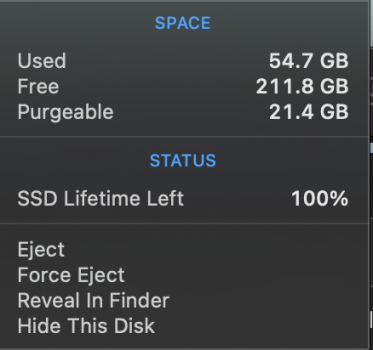Even if these numbers are accurate, wouldn’t it stand to reason that any new system does a significantly higher amount of write operations in the initial stages?
You get a new machine and :
- Go through the initial setup
- install a bunch of apps
- Sync your icloud (or any other cloud) data folders
- All of that initial file indexing
- Photo Indexing
All these operations are bound to be very write intensive - and the list goes on.
Stands to reason that these bulk one time processes would skew the R/W operations in the initial few days and would settle down on a much lower rate going forward.
I personally think this whole thing is yet another eyeball grabbing post by some random redditer - but for the sake of science, I will tabulate my current numbers (after about 2 months of use) and incremental write usage numbers to see if my hypothesis is correct
Ok, I officially call BS on this eyegrab of a twitter/reddit/whatever post !
Here is a screenshot from a M1 - exactly 2 months old with many years worth of user data synced from iCloud (and associated extensive indexing of data/ photos) and used as a daily driver...
Vs
A 2.5 month old LG Gram (10th Gen Intel + windows) setup as a fresh machine with no past user data copying / indexing and very light/ intermittent usage
Both devices are 250GB though the LG has 16GB RAM
TL;DR, the M1 is ~3.6 TBW and the LG is ~2 TBW - the difference being exactly as expected given the heavier usage for the M1 + the past data/ photo indexing


